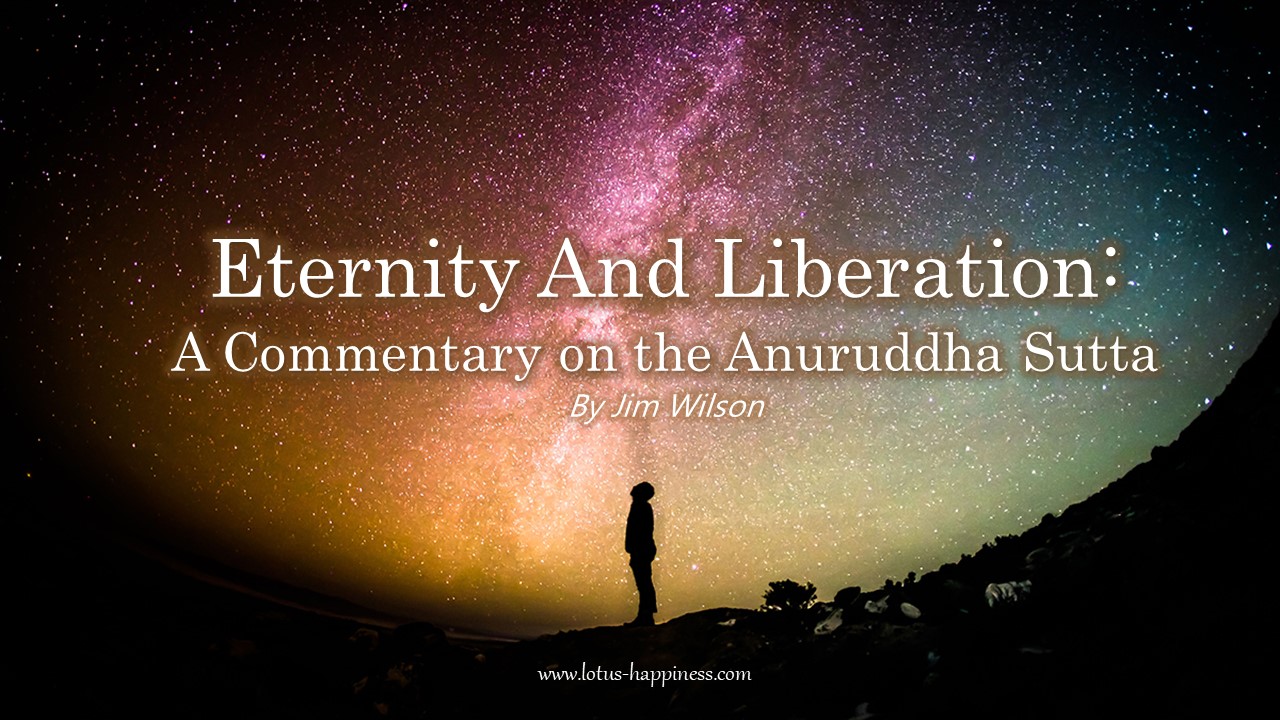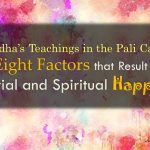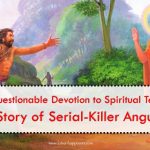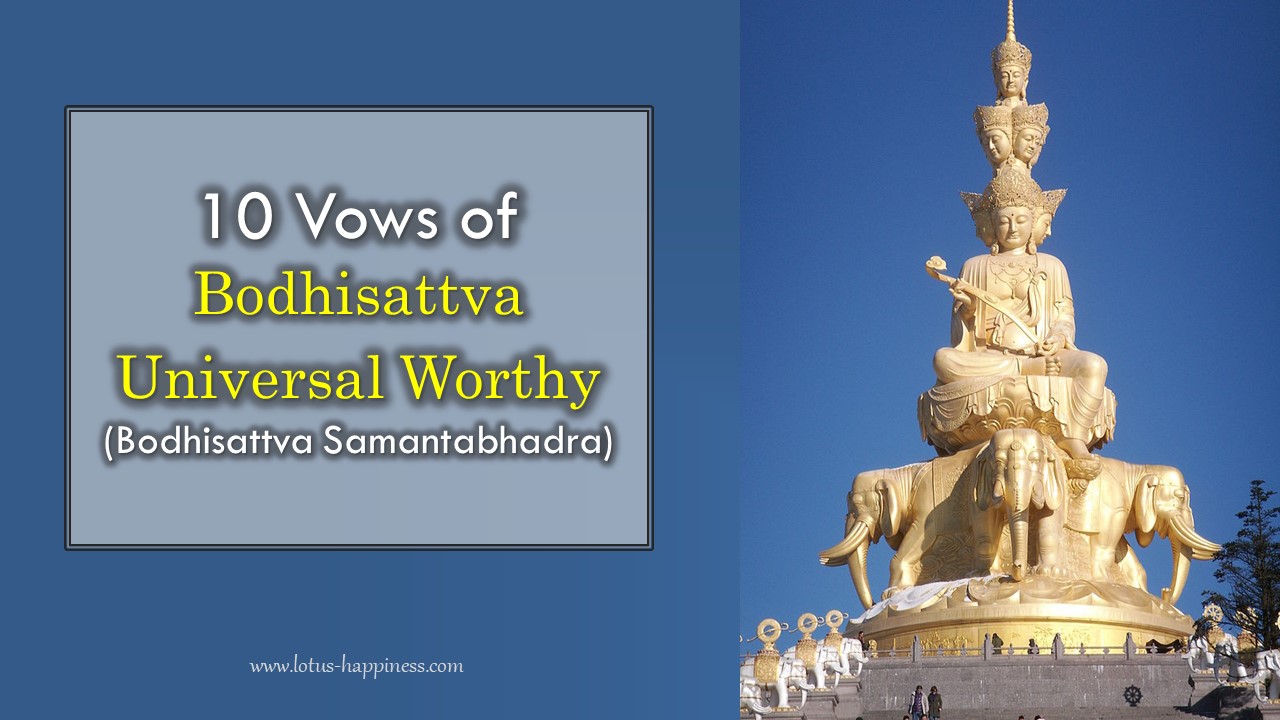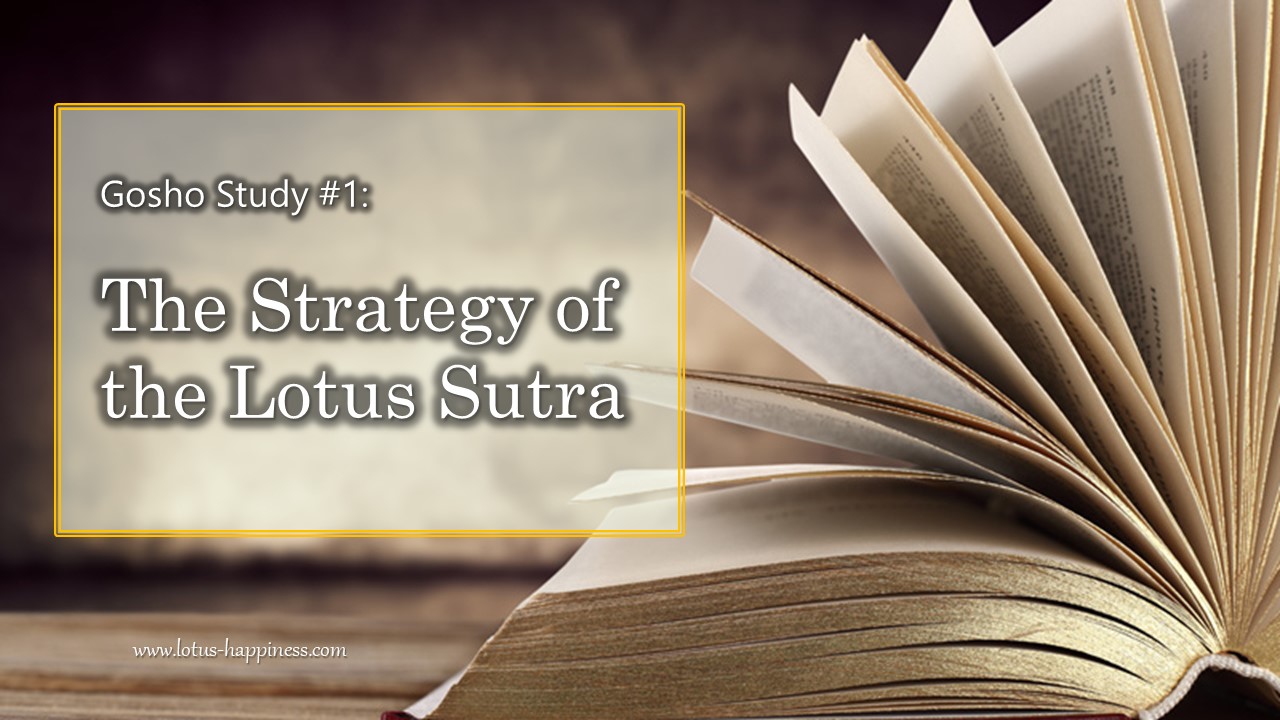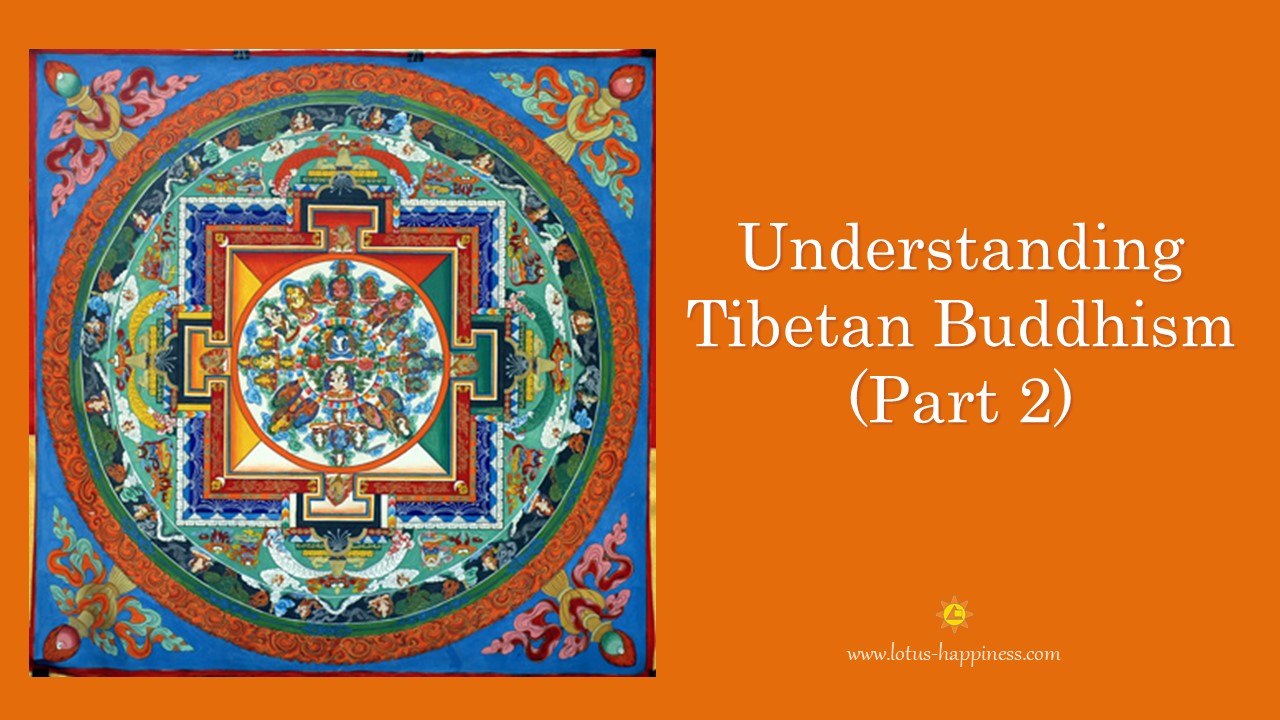Eternity And Liberation: A Commentary On The Anuruddha Sutta
by Jim Wilson
Eternity and Liberation
On a number of occasions when someone asked the Buddha about the nature of the eternal, or the extent of eternity, or whether eternity existed, the Buddha refused to answer, or responded by saying that such questions were not conducive to practice, to liberation. In the sutras, the Buddha tends to avoid using the word eternity. However, the Buddha does use the words “deathless”, and “unborn”, which he does discuss, and which I take as synonyms for the eternal.
Why would the Buddha shift his focus from a word like the eternal to a word like the deathless? I believe this has to do with the central insight of the Buddha, which he called interdependent transformation, or dependent origination. From the perspective of interdependent transformation there does not exist any thing which exists independently, on its own, or separately. When people inquire as to the nature of the eternal, often there exists an assumption that there exists an eternal thing, and by thing, they mean separately existing thing. Because the eternal does not manifest as a thing, such as a deity, or a heavenly realm, the Buddha seems to have taken the strategy of deflecting altogether that line of inquiry. Instead, he emphasizes the “deathless”, the “unborn”, the two terms which I have found most often in the Discourses.
The term “deathless” means always existing. The term “unborn” also means always existing. Together, the deathless and the unborn refer to the eternal if we understand the eternal not as a thing, but as the always existing, always present. Insight into the nature of the deathless is considered a gate to liberation and enlightenment. This is wonderfully illustrated in a short Sutta from the Pali Canon called The Anuruddha Sutta. Because of the brevity of this discourse, I shall quote it first in full:
Now the venerable Anuruddha went to see the venerable Shariputta. On coming to him he greeted him courteously, and, after the exchange of greetings and courtesies, sat down at one side. So seated the venerable Anuruddha said this:
“Here in this world, friend Shariputta, with the deva-sight, purified and surpassing that of men, I can see the thousandfold world-system. Strenuous and unshaken is my energy. Mindfulness is set up in me untroubled. My body is calmed, not perturbed. My mind is collected, one-pointed. Yet for all that my heart is not released from the hindrances without grasping.”
“Well, Anuruddha, as to your statement about seeing the thousandfold world-system, that is just your conceit. As to your statement about being strenuous and unshaken and so forth, — that is just arrogance. As to your statement about your heart not being released from the hindrances, that is just worrying. It would indeed be well for the venerable Anuruddha if he were to abandon these three conditions, if he were not to think about them, but were to focus his mind on the deathless element.”
So later on the venerable Anuruddha abandoned these three conditions, paid no attention to them, but focused his mind on the deathless element. And it came to pass that the venerable Anuruddha, living alone, secluded, earnest, ardent and aspiring, in no long time attained the goal supreme of the holy life, for which clansmen rightly go forth from home to the homeless: even in this very life he himself by his own intuitional powers realized it, and having attained it dwelt therein, for he knew: Birth is destroyed: lived is the holy life: done is my task: for me there is no more of being thus. And the venerable Anuruddha was yet another of the realized saints.
The Anuruddha Sutta is a simple and clear presentation of the efficacy that contemplating eternity, or the deathless element, has for liberation. In a sense, the Sutra says that such contemplation in and of itself constitutes liberation. Let’s examine the Sutta in detail.
The Anuruddha Sutta
Now the venerable Anuruddha went to see the venerable Shariputta. On coming to him he greeted him courteously, and, after the exchange of greetings and courtesies, sat down at one side.
Comment:
This Sutta consists of a dialog between two disciples of the Buddha. The first one, Shariputta, is a Saint, or Arhat, meaning someone who has attained liberation. A number of Suttas in the Buddhist Canon contain teachings from the immediate disciples of the Buddha, such as Shariputta and Dhammadinna. This indicates that even at a very early stage, it was understood that others besides the Buddha himself, could attain to the level of understanding and enlightenment that the originator of the teaching had attained. In effect, these Buddhist Saints had themselves become Buddhas, or enlightened ones, and could therefore function as teachers for the community. I suspect that as the community grew in size, access to the Buddha became more difficult. As access to the Buddha became more difficult, newer disciples would gravitate to one of the Saints, those acknowledged by the community as also having an enlightened understanding and realization. I suspect that something like this was going between Anuruddha and Shariputta, for this short text seems to indicate a long familiarity between the two of them.
The Sutta:
So seated the venerable Anuruddha said this:
‘Here in this world, friend Shariputta, with the deva-sight, purified and surpassing that of men, I can see the thousandfold world-system.’
Comment:
Anuruddha is making a claim that he has developed an occult power, a power of vision which allows him to literally see/perceive world systems. It is interesting how often in the Discourses there arises discussion about occult powers and their status. It must have been a frequent, and often distracting, topic of discussion. It remains so today. Many people feel that spiritual awakening means the acquisition of such powers. Comprehending compassion and wisdom, however, does not depend upon the acquisition of these powers and has no connection to them. When I say no connection I mean that someone can possess occult powers without having either wisdom or compassion, and that, conversely, someone can attain both wisdom and compassion and not have any occult powers. For this reason, the Discourses point out that even should someone attain these powers, that does not mean that they will have awakened to Dharma, the teachings of the Buddha. A Discourse from the Middle Length Discourses, The Shorter Discourse to Sakuludaayin makes this point very clearly. Udaayin expresses his interest in and concern about occult powers, specifically the ability to recall past lives and the ability to perceive other realms. The Buddha responds to this as follows:
Udaayin, if someone should recollect his manifold past lives, that is, one birth, two births … thus, with their aspects and particulars, should he recollect his manifold past lives, then either he might ask me a question about the past or I might ask him a question about the past, and he might satisfy my mind with his answer to my question or I might satisfy his mind with my answer to his question. If someone with the divine eye, which is purified and surpasses the human, should see beings passing away and reappearing, inferior and superior, fair and ugly, fortunate and unfortunate … and understand how beings pass on according to their actions, then either he might ask me a question about the future or I might ask him a question about the future, and he might satisfy my mind with his answer to my question or I might satisfy his mind with my answer to his question. But let be the past, Udaayin, let be the future. I shall teach you the Dharma: When this exists, that comes to be; with the arising of this, that arises. When this does not exist, that does not come to be; with the cessation of this, that ceases.
(The Middle Length Discourses of the Buddha, translated by Bhikkhu Ñaa.namoli and Bhikkhu Bodhi, Wisdom Publications, Boston, 1995, page 655.)
As we shall see in the response below, Shariputta has learned well this simple lesson.
The Sutta:
Strenuous and unshaken is my energy.
Comment:
Here Anuruddha is claiming a different kind of power; that he has acquired some kind of access to unlimited energy, that he never tires. Notice that this does not necessarily imply that Anuruddha is using that energy to comprehend, or manifest, wisdom and compassion.
The Sutta:
Mindfulness is set up in me untroubled. My body is calmed, not perturbed. My mind is collected, one-pointed.
Comment:
Here the claim is more subtle. The subtlety is a source of much confusion. Having a onepointed mind, the development of mindfulness and concentration, does not, in and of itself, or by itself, lead to enlightenment; meaning the understanding of wisdom, or the dependent and interconnected nature of all things, and compassion, which means being able to function in the world from that wisdom. Onepointedness of mind allows for concentration and effective mentality, but that onepointedness can be used for any purpose. Onepointedness can be used to make one a more effective accountant, businessperson, cook, athlete, gardener, etc.. Now this is not bad, and in many ways we can consider it even good. But there is no necessary connection between the onepointedness of mind and the wisdom of the Dharma. Onepointedness and a collected mind are necessary for the comprehension of the Dharma, but they do not by themselves constitute the realization of the Dharma. Because onepointedness is a very pleasing mental state, people sometimes confuse onepointedness with realization itself, when it actually only constitutes a preliminary to, a foundation for, the comprehension of the wisdom and compassion of the Dharma. Anuruddha has, it seems, made this mistake; equating onepointedness with the Dharma itself.
The Sutta:
Yet, for all that my heart is not released from the hindrances without grasping.
Comment:
There is displayed here a deep sense of honesty from Anuruddha. In spite of these attainments, Anuruddha is honest enough to acknowledge that his heart is not at peace. He observes this because there still remains the basic tendency to “grasp”, or cling, which Anuruddha observes in his heart. He recognizes this as a signal that his practice is not complete, that he still has more to do, and for this reason he goes to Shariputta. I suspect also some confusion in Anuruddha’s mind. I suspect that Anuruddha expected that onepointedness would necessarily lead to non-grasping and to a settled and peaceful heart. Anuruddha has discovered that it is possible to be both onepointed and still not overcome grasping and clinging.
The Sutta:
Shariputta responds:
Well, Anuruddha, as to your statement about seeing the thousandfold world-system, that is just your conceit.
Comment:
The word “conceit” could mean several things. It might mean that Shariputta simply doesn’t believe that Anuruddha actually sees the thousandfold world-system. Or it might mean that Shariputta believes that Anuruddha’s ability to see the thousandfold world system is leading Anuruddha to develop a conceited attitude. I suspect a little of both at work here.
Notice that ShariputtaÂ’s response is kind of sharp. My feeling here is that Shariputta and Anuruddha have known each other for some time. Perhaps Anuruddha had selected Shariputta as his principle teacher and guide in the dharma. The brevity and sharpness of ShariputtaÂ’s response indicates a high level of trust exists between the two.
The Sutta:
Shariputta continues:
As to your statement about being strenuous and unshaken and so forth, — that is just arrogance.
Comment:
This continues in the same vein. Shariputta continues to forcibly deflect the claims of Anuruddha. I think that arrogance in this context refers to the idea that AnuruddhaÂ’s energy is the equivalent of having learned the Dharma. One can have great energy and dedication about all manner of things. Simply having energy and dedication does not in itself constitute a great accomplishment in terms of awakening to the Dharma, the realm of wisdom and compassion.
The Sutta:
Shariputta continues:
As to your statement about your heart not being released from the hindrances, that is just worrying.
Comment:
A very interesting comment. I think that Shariputta is pointing out that Anuruddha is locked into some kind of emotional/intellectual analysis. Worrying is a subtle form of fear. One of the hallmarks of realization is the falling away of fear. The Heart Sutra specifically points to a mind free from fear as a mark of an awakened mind. If Anuruddha is locked in this kind of fretful, fearful, worrying, it would point to AnuruddhaÂ’s lack of accomplishment and understanding.
Worry and fear arise from a sense of limitation. Comprehending that this state of worry is the root of AnuruddhaÂ’s difficulties, Shariputta proposes a direct antidote to that state of mind which continues to hinder the ability of Anuruddha to awaken to the ever present wisdom and compassion that constitutes his true nature.
The Sutta:
Shariputta continues:
It would indeed be well for the venerable Anuruddha if he were to abandon these three conditions, if he were not to think about them, but were to focus his mind on the deathless element.
Comment:
Shariputta recommends that Anuruddha abandon his concern with occult vision or deva sight, abandon his concern with developing unshakable energy, and, most remarkably, abandon his concern with mindfulness and one-pointedness. Instead, Anuruddha should focus his mind on the deathless element. I understand the deathless to mean the eternal. The deathless means that which never dies, because it always exists. It is also often referred to as the unborn. The unborn means that which always exists because it has no beginning. Unborn and deathless, it has no beginning and no ending. It is considered in the Discourses synonymous with nirvana, ultimate liberation.
Though Shariputta’s advice in many ways seems remarkable, it reflects without distortion the teaching of the Buddha. For example, in Sutra 26 of the Discourses, titled “The Noble Search”, the Buddha says the following:
And what is the noble search? Here someone being himself subject to birth, having understood the danger in what is subject to birth, seeks the unborn supreme security from bondage, Nirvana; being himself subject to aging, having understood the danger in what is subject to aging, he seeks the unaging supreme security from bondage, Nirvana; being himself subject to sickness, having understood the danger in what is subject to sickness, he seeks the unailing supreme security from bondage, Nirvana; being himself subject to death, having understood the danger in what is subject to death, he seeks the deathless supreme security from bondage, Nirvana; being himself subject to sorrow, having understood the danger in what is subject to sorrow, he seeks the sorrowless supreme security from bondage, Nirvana; being himself subject to defilement, he seeks the undefiled supreme security from bondage, Nirvana. This is the noble search.
(The Middle Length Discourses of the Buddha, translated by Bhikkhu Ñaa.namoli and Bhikkhu Bodhi, Wisdom Publications, Boston, 1995, pages 255 and 256.)
This passage equates the deathless with the unborn and in turn with Nirvana. The recommendation here is to focus on the deathless, the unborn, the element of Nirvana in existence, and this will bring about the cessation of suffering, grief, anxiety, and despair.
The Anuruddha Sutta is very terse and does not elaborate on the meaning of the deathless. The above quoted passage helps us to understand what Shariputta meant by the deathless. In another Discourse, called “The Way To The Imperturbable”, Sutra 106 from the Middle Length Discourses, the Buddha elaborates further on the meaning of the deathless. Aananda asks:
“But, venerable sir, what is noble liberation?”
“Here, Aananda, a noble disciple considers thus: ‘Sensual pleasures here and now and sensual pleasures in lives to come, sensual perceptions here and now and material forms in lives to come, perceptions of forms here and now and perceptions of forms in lives to come, perceptions of the imperturbable, perceptions of the base of nothingness, and perceptions of the base of neither-perception-nor-non-perception — this is personality as far as personality extends. This is the Deathless, namely, the liberation of the mind through not clinging.”
(The Middle Length Discourses of the Buddha, translated by Bhikkhu Ñaa.namoli and Bhikkhu Bodhi, Wisdom Publications, Boston, 1995, page 873.)
And earlier in the same Discourse, the Buddha says, “A bhikku, Aananda, who is without clinging attains Nirvana.”
Notice here that Nirvana is equated with a state of mind (mind understood in its broader meaning, not exclusively in terms of its discriminative and intellectual function, though not excluding those functions). Nirvana is not located some place, or at some time. This state of mind is labeled as the mind that does not cling.
The Sutta:
So later on the venerable Anuruddha abandoned these three conditions, paid no attention to them, but focused his mind on the deathless element. And it came to pass that the venerable Anuruddha, living alone, secluded, earnest, ardent and aspiring, in no long time attained the goal supreme of the holy life, for which clansmen rightly go forth from home to the homeless: even in this very life he himself by his own intuitional powers realized it, and having attained it dwelt therein, for he knew: Birth is destroyed: lived is the holy life: done is my task: for me there is no more of being thus. And the venerable Anuruddha was yet another of the realized Saints.
Comment:
The great lesson of this Discourse is that if we drop all peripheral concerns, such as concerns with occult powers, concerns with even such seemingly spiritual goals as one-pointedness, and shift our attention to the presence of eternity, like Anuruddha, who was just a person like you and me, we can then awaken to the deathless, to the unborn, to the unlocated Nirvana/Liberation, and we also can become one of the community of the Saints.
Note: The Anuruddha Sutta as used here is based on the following:
Gradual Sayings, Volume I, translated by F. L. Woodward, Pali Text Society, Oxford, original copyright 1932, this edition 1995, pages 260 and 261.
Source: Nichiren Coffee

